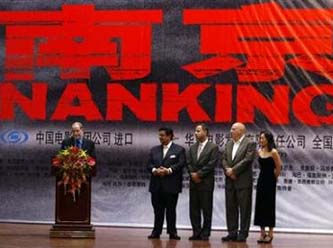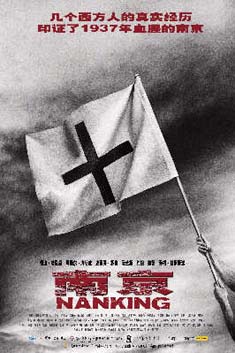| Home / Entertainment / News | Tools: Save | Print | E-mail | Most Read |
| Nanjing Massacre Documentary to Be Screened in China |
| Adjust font size: |
A US documentary chronicling Japan's notorious 1937 invasion of the Chinese city Nanjing will open in Chinese cinemas on July 7, the 70th anniversary of the War of Resistance against Japan.
Director Bill Guttentag, Producer Ted Leonsis, Co-Director Dan Sturman, Producer Michael Jacobs, and Co-Producer Violet Du Feng came to Beijing Tuesday to attend the premiere of the film, then they left for Shanghai to promote the film. When interviewed by Oriental Morning Post yesterday, Bill Guttentag said he first thought to do such a film after he read the book Rape of Nanking recommended by the producer Ted Leonsis. "I felt that was a forgotten massacre in history, and the two words 'forgotten' and 'massacre' shouldn't be put together. I hope we can tell people the truth. For the Chinese audience, we hope you can respect such history from the bottom of your heart!" However, the film may miss the opportunity to be screened in the very place where tragedy happened - Nanjing. In all of Jiangsu Province, only Wuxi city has bought a copy of the film. An official from the Oriental Cinema Circuit explained to the paper that this is summer vacation, when people will embrace blockbusters like Transformers. The 90-minute documentary, Nanking (the old spelling of the city's name), will be screened after the summer vacation. Otherwise there will be few people who immediately want to see this film, and the educational meaning of the film will not be fully realized, he added. Beijing's cinemas have already bought 8 copies while Shanghai's bought 18 copies to screen. They are willing to leave certain space for Nanking to screen even though other blockbusters will rob the box offices. In January 2007, the documentary Nanking debuted at Sundance Film Festival where it received the Editing Award. In April, it won the Humanitarian Award for Best Documentary at the Hong Kong International Film Festival. But Japanese filmmaker Satoru Mizushima called the film a "setup by China to control intelligence," and plans to release his own documentary, The Truth about Nanjing, in which the massacre is portrayed as merely political propaganda. Besides, not one Japanese distributor has approached the Nanking production team to express their willingness to distribute this documentary in Japan. When asked about the controversy, Guttentag said many Japanese people still refused to look at the truth in history. "I heard about the news when I was at Sundance. I felt very furious. There were so many documents and photos out there, how are they going to twist the history?" Guttentag said.
The documentary also includes film footage shot by John Magee, an Episcopal pastor in Nanjing from 1912 to 1940, who recorded the massacre and rescued many Chinese people. On July 7, 1937, the intruding Japanese forces assaulted Lugou Bridge and Chinese soldiers responded with gunfire. This has been known as the Lugou Bridge Incident, or "July 7 Incident," which marked the beginning of the War of Resistance against Japan in China. The Nanjing Massacre occurred in December 1937 when the Japanese troops occupied the then capital of China. More than 300,000 Chinese are believed murdered and thousands raped. Ted Leonsis, the film's producer, said the decision to put the Nanjing Massacre on screen was made after he read the Rape of Nanking, written by Chinese American author Iris Chang in early 2005. Leonsis, also AOL vice chairman, said he was ashamed of his ignorance of the atrocity and realized that most Americans had no idea what had happened in China in the winter of 1937. In the summer of 2005, Leonsis invited the Academy Award-winning writer/director team of Bill Guttentag and Dan Sturman to shoot the documentary. To find the materials that would bring the story of Nanking to life, Guttentag, Sturman, and their production team collected thousands of pages of letters, journals, and diaries for three months by trawling original sources and archives in the United States, Europe, and Asia. In China, they met historians, archivists, and scholars who told them where to look for the best photographs and footage in China and across the world. The team also interviewed 22 survivors in the cities of Nanjing, Suzhou, and Shanghai. Filming in Japan was more difficult. The production team said it was challenging to find former Japanese soldiers willing to talk about their experiences in Nanjing. The Japanese soldiers who participated in the film were found through members of the Japanese peace movement. Upon returning from Asia, the Nanking production team began the final piece of the filming -- the staged reading with actors. Filming took place in Los Angeles in August 2006. The documentary was narrated by Woody Harrelson, Stephen Dorff, and Mariel Hemingway. The documentary premiered in Beijing on Tuesday; in North America, it will be released by THINKFilm in December to coincide with the 70th anniversary of the massacres in Nanking. (Xinhua News Agency, China.org.cn by Zhang Rui July 5, 2007) |
| Tools: Save | Print | E-mail | Most Read |
 |
| Related Stories |
|

